The world’s richest countries need to invest in reskilling and upskilling efforts quickly if they want to avoid a long-term rise in unemployment, the 2021 OECD Employment Outlook, published this month, found.
Across OECD countries, the unemployment rate equals 6.6% of the labour force, the OECD’s data shows. The pandemic has transformed the world of work, accelerating digital processes and innovation. As we emerge from a post-pandemic world, many jobs and work opportunities require vastly different skillsets than prior to the pandemic.
In light of these changes, workers are increasingly wondering how they can stay relevant in their industries for both current and future roles. Low skilled workers who were most likely to lose their jobs face a unique challenge: they are ill-equipped to move to the industries and fields were hiring is strongest. And the longer a worker stays unemployed, the less employable they become.
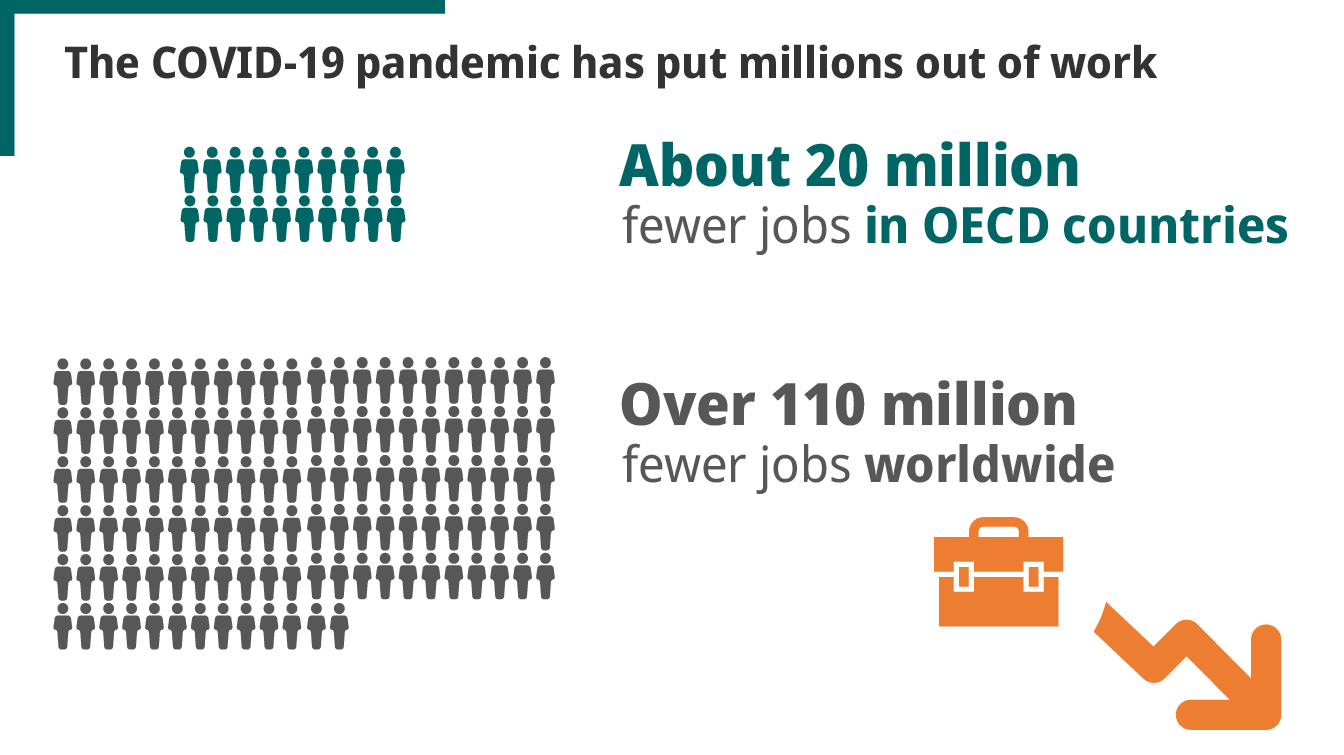
According to HP’s Workforce Evolution Study, 59% of office workers across Europe agree that their work has changed due to the pandemic, which has emphasized the need for lifelong learning.
Now is the time for executives and businesses to reskill and upskill workers for the future of work post-pandemic recovery, the OECD outlook urges, as employment rates might not return to pre-pandemic levels until at least 2023.
Here are the key takeaways and insights from the 2021 OECD Employment report.
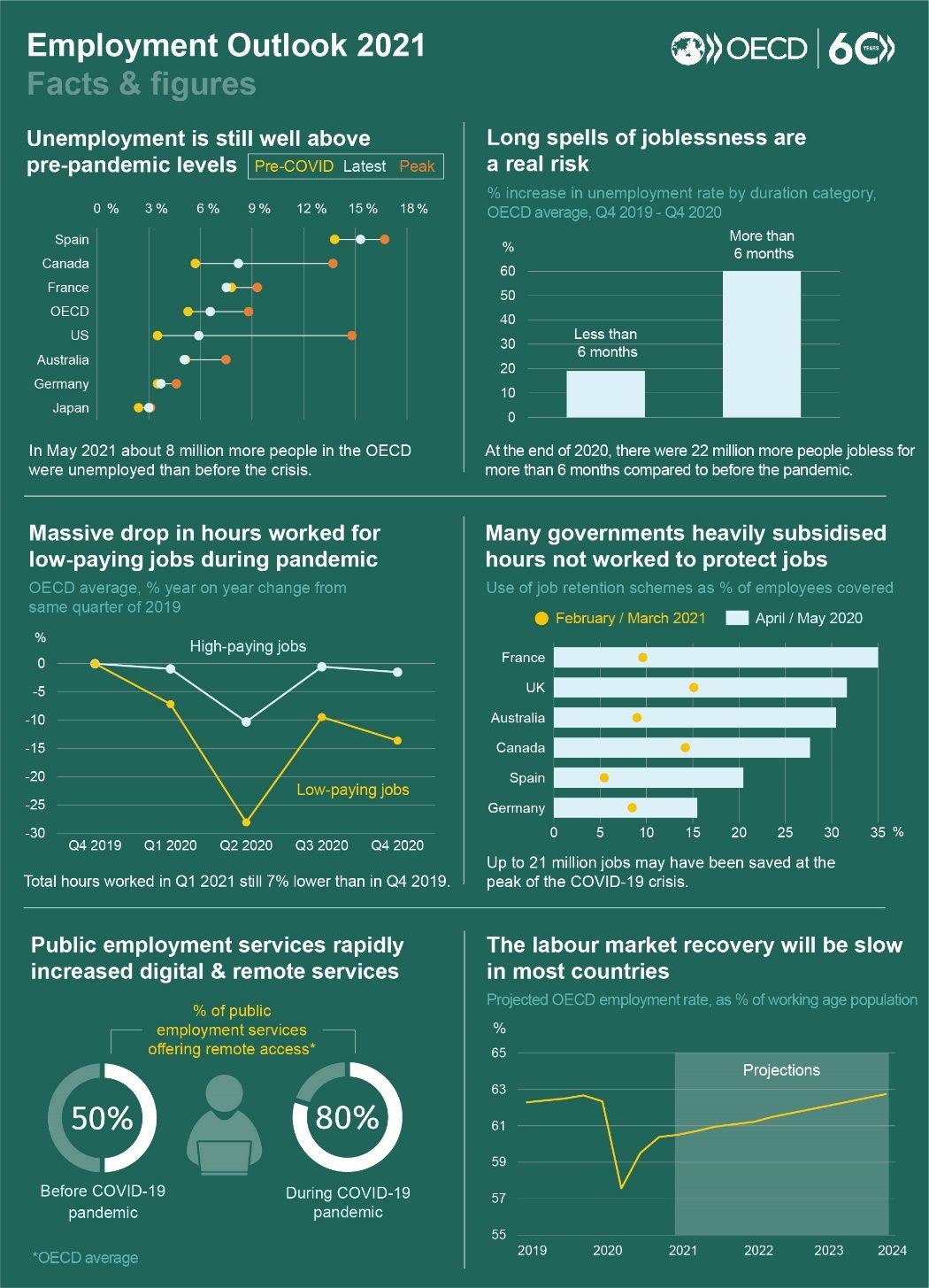
The Impact on Youth and Vulnerable Groups
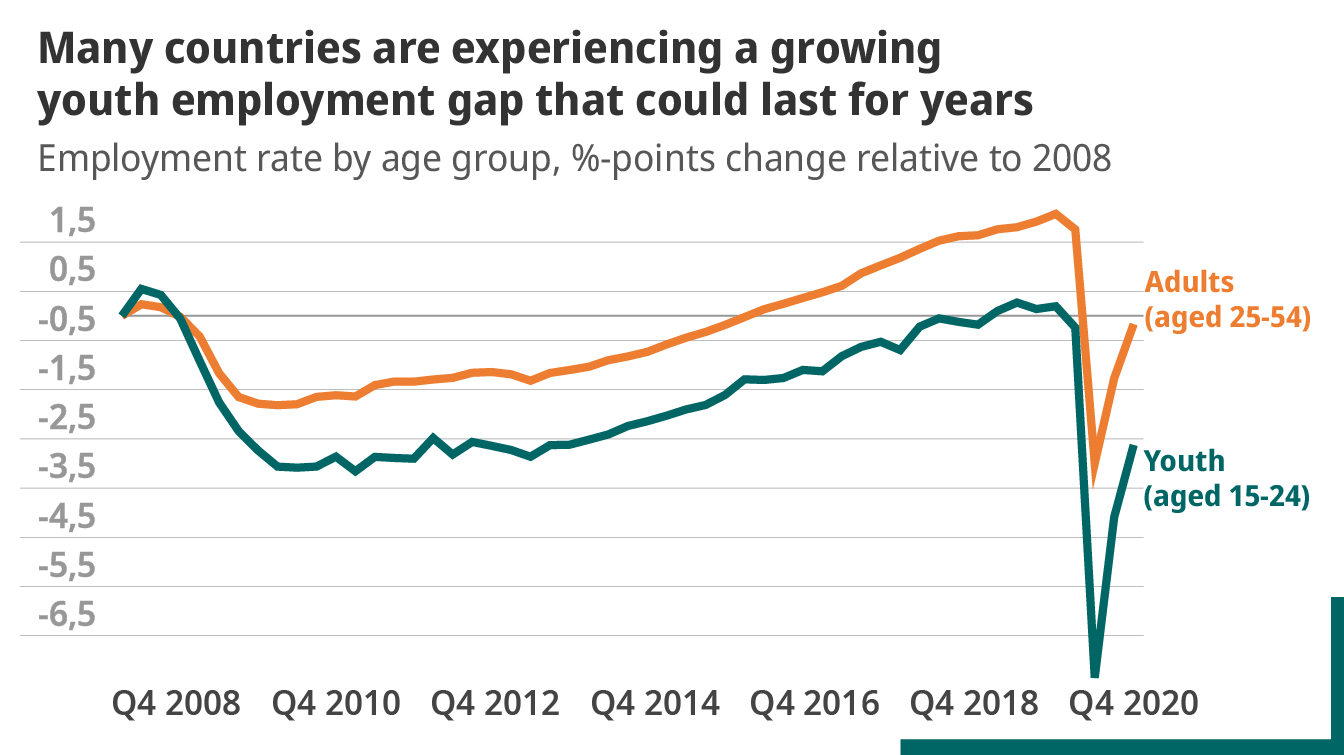
The pandemic has disproportionately impacted vulnerable groups that already face major employment obstacles. This includes low qualified workers, women, single parents with children, young people and people with disabilities, among others.
For these groups, the pandemic had a much bigger impact. The consequence of the crisis on the number of working hours was three times heavier on people with low education than those with higher education. Still today, the number of hours worked across OECD countries are 7% below the pre-crisis level.
The report concludes that vulnerable people have lost their jobs, whereas highly educated people have only seen their number of working hours reduced.
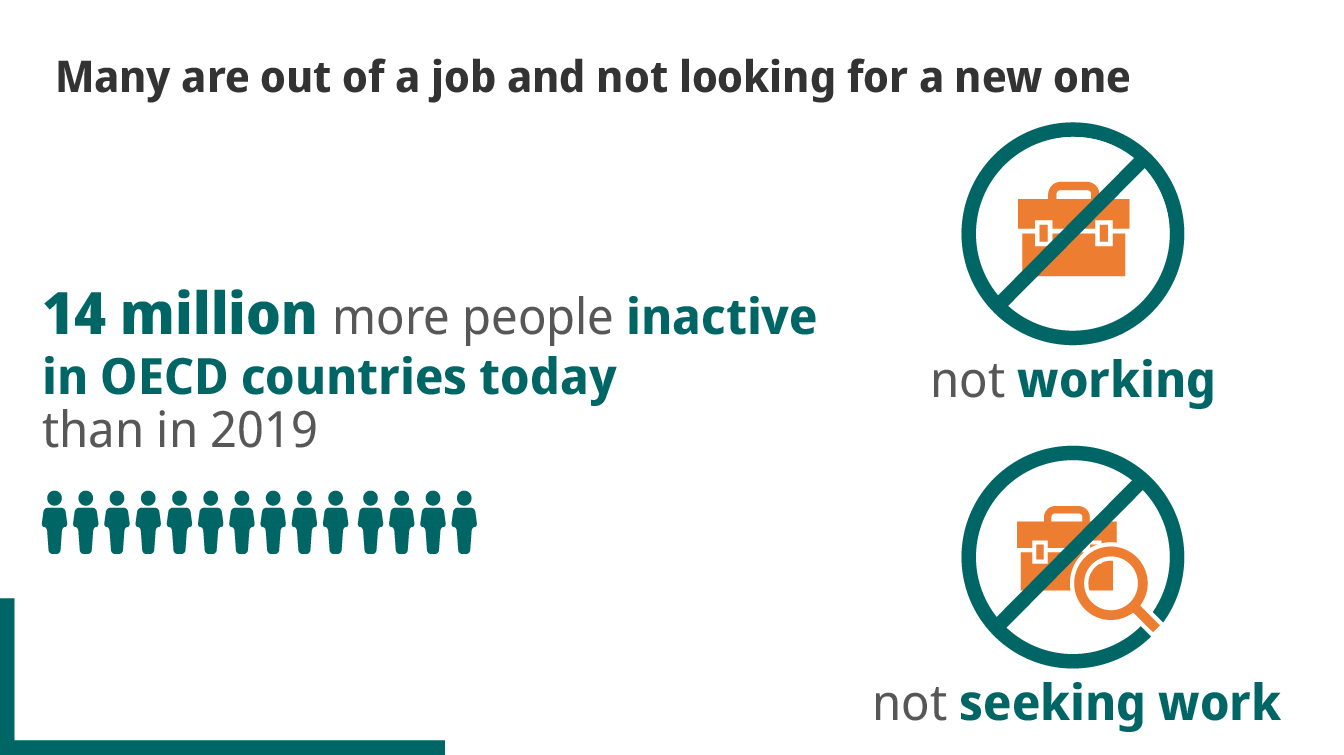
Young workers have also been impacted. Youth unemployment has surged in OECD countries. Number of hours worked by young people has decreased by 26% (whereas it is a decrease of 15% for older generations). Young people entering the labour market have struggled to find employment due to the limited vacancies.
The NEET (Not in Employment, Education or Training) level for young people 15 to 29 years old has reached 12%, an increase that reverses the trend of the last decade. For example, during the 2008 crisis, it took 10 years for youth employment to recover. The OECD warns governments of the need to implement policies to shorten the recovery period.
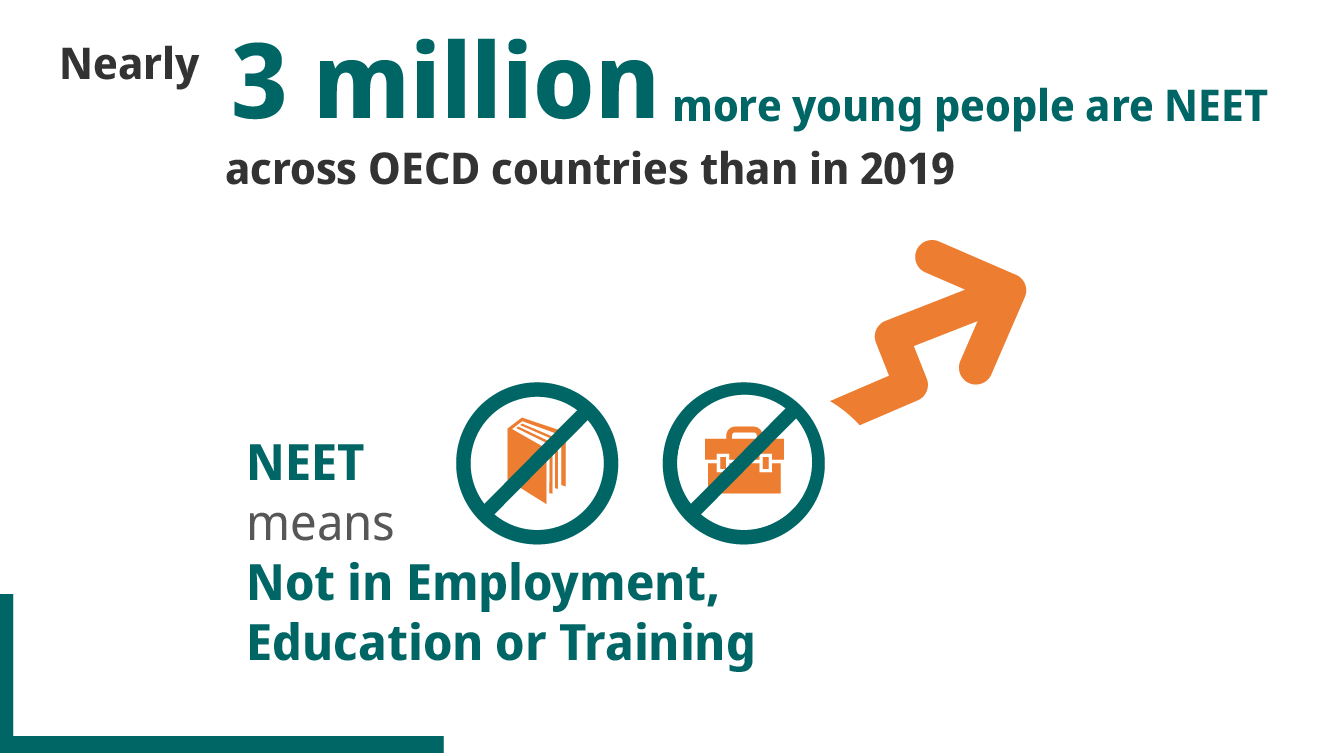
The Gender Divide
Both men and women have been equally impacted by the pandemic in the EU, The OECD employment outlook found. Contrary to popular belief, the agency found that job losses for both genders were somewhat equal.
Women were more concentrated in food service, retail, and accommodation sectors, all impacted by strict lockdowns. However, they were also equally as likely to work in education, public administration, and health, sectors protected from job loss.
Men, on the other hand, were also likely to work in industries impacted by heavy job loss, like construction or agriculture. Those sectors adapted, and workers were allowed to return to work by the end of 2020.
Understanding the Employment Trends
As the world shifts to a post-pandemic future, it’s crucial to understand how companies plan to bring back employees. According to the OECD, businesses are more likely to bring back short-term workers before they create new jobs at scale.
There are 14 million more people that are classified as inactive today compared to 2019, which means that they are not working but also not looking to work. In fact, by the end of 2020, more than 60% of those people had been unemployed for over six months. Long term unemployment represents a major risk for the recovery, the report warns.
“A widening gap may develop between those who have weathered the crisis through reduced hours and short periods on temporary lay-off, and those who have found themselves jobless – increasing distance from the labour force, exhausting benefit entitlements and risking long-term scars,” the OCED report said.
Many of the jobs hit hardest by the pandemic were already at risk of loss, the OECD said. With automation on the rise, these positions could disappear entirely as new digital technologies grow in popularity.
On the other hand, jobs in healthcare and green energy are on the rise for many developed countries. Transitioning towards a truly sustainable economy is one of the defining missions of our time as well as future generations. Above all, climate change is increasingly recognized as a threat multiplier, amplifying other factors such as inequality, poverty, rising unemployment and migration pressures. At the Adecco Group, we are convinced that moving toward a greener economy will require a range of new skills, investments and technologies to transform challenges into real growth opportunities and make the future work for everyone.
But how do we best mitigate its expectedly negative impacts on labour markets and turn them into opportunities for the future? The answer rests in skills ,reskilling, and career guidance.
During the launch event of the report, OECD Secretary-General Mathias Cormann emphasised that businesses and the private sector in general are the driver for job creation and growth. The focus should then be on restoring business’ confidence and incentivise their investment in the future. As a provider of Private Employment Services, The Adecco Group is committed to supporting jobseekers and calls for a strong collaboration with Public Employment Services.
Moving Forward
The impact of the pandemic on the labour market is only starting to unfold now. Importantly, the OECD Employment Outlook recognizes the Private Sector as a driver of the recovery, underlining that for employment levels to recover, business confidence is determinant.
The Employment Outlook identifies two significant and concurring labour market challenges: labour market participation is dropping while digitalisation and economic reform require new skillsets. Both were already present before Covid-19 hit, but their impact is felt even stronger. The Outlook thus underlines a strong sense of urgency for labour market support. It highlights the importance of labour market (activation & transition) support, career guidance and lifelong learning. The Adecco Group is at the heart of the solutions required and will reinforce its work hand in hand with partners around the world, starting with the Public Employment Services.



